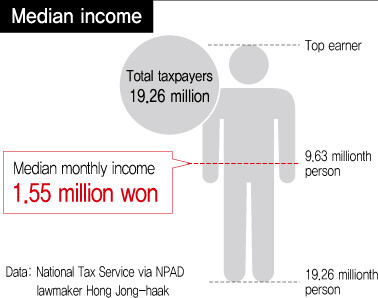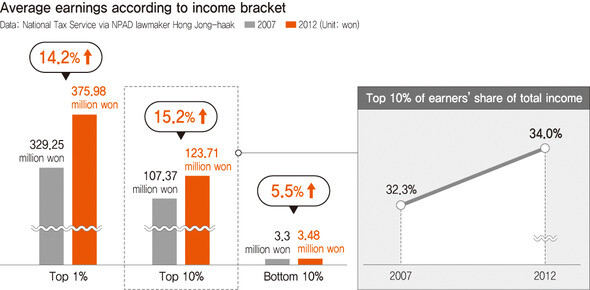hankyoreh
Links to other country sites 다른 나라 사이트 링크
10 million people nationwide earning only around $1,500 per month

By Ryu Yi-geun, staff reporter
South Korea has close to 10 million people earning less than 1.55 million won (US$1,530) a month, National Tax Service figures show.
The numbers point to intensifying income polarization over the past several years as high earners account for an ever larger share of total income.
According to 2012 National Tax Service income percentile data acquired on June 9 from the office of New Politics Alliance for Democracy (NPAD) lawmaker Hong Jong-haak, the median annual income when all 19.26 million taxpayers were ranked from highest to lowest earnings stood at just 18.52 million won (US$18,230). This means that 9.63 million South Koreans are earning less than 1.55 million won a month, chiefly from labor or their own small businesses.

The total of 19.26 includes 14.1 million income earners and comprehensive income tax payers, not counting duplicates, along with another 5.16 million low-income people who are not subject to earned income taxation.
Earned income tax is levied on wages earned from a company, while the comprehensive income tax is levied on business income, interest, and dividends. Ninety-two percent of the people who did not pay taxes - generally because their earnings were too low - made less than 20 million won (US$19,700) a year.
Figures for this group were based on income scale, while the data for comprehensive income tax included only the estimated number of taxpayers (around 1.39 million in 2012), which meant they could not be used for median income analysis. The actual median income is predicted to be even lower if individuals with relatively low earnings who were not subject to taxation - such as farmers, fisherman, and day laborers - are factored in.
The numbers showed high earners accounting for an ever larger percentage of total income over the five years from 2007 to 2012. The 1.41 million people who represented the top 10% of the 14.1 million taxpayers examined for combined income percentile (earned income and comprehensive income tax payers with duplicates removed) saw their percentage of total income grow from 32.3% in 2007 to 34.0% in 2012. During the same period, average income for the top decile rose by 15.2% from 107.37 million won (US$105,700) to 123.71 million won (US$121,700), or a 16.34 million won (US$16,000) jump.
The rise was even sharper for the 141,047 earners who represented the top 1%. In the five-year period, their average income increased by 46.73 million won (US$46,000), or 14.2%, from 329.25 million won (US$324,000) to 375.98 million won (US$370,000). The concentration of wealth at the top is believed to be even higher when transfer gains from real estate sales - typically found only among a small number of the very wealthy - are factored in, along with people who did not qualify to pay taxes or were exempted from income tax reporting.
Over the same period, income for the lowest earning 10% rose by just 5.5% from an average of 3.3 million won (US$3,250) per capita to 3.48 million won (US$3,420), an increase of 180,000 won (US$170).
The figures show that despite continuous economic growth from year to year, the rewards are flowing from bottom to top, rather than in the other direction. It’s a vicious cycle in which the concentration of the gains from growth among the very highest earners is sapping the momentum for growth itself. Now the recovery of needed levels of consumption as a way of driving growth appears unlikely without some measures to relieve the concentration of wealth at the top.

Please direct questions or comments to [english@hani.co.kr]

Editorial・opinion
![[Column] Has Korea, too, crossed the Rubicon on China? [Column] Has Korea, too, crossed the Rubicon on China?](https://flexible.img.hani.co.kr/flexible/normal/500/300/imgdb/original/2024/0419/9317135153409185.jpg) [Column] Has Korea, too, crossed the Rubicon on China?
[Column] Has Korea, too, crossed the Rubicon on China?![[Correspondent’s column] In Japan’s alliance with US, echoes of its past alliances with UK [Correspondent’s column] In Japan’s alliance with US, echoes of its past alliances with UK](https://flexible.img.hani.co.kr/flexible/normal/500/300/imgdb/original/2024/0419/2317135166563519.jpg) [Correspondent’s column] In Japan’s alliance with US, echoes of its past alliances with UK
[Correspondent’s column] In Japan’s alliance with US, echoes of its past alliances with UK- [Editorial] Does Yoon think the Korean public is wrong?
- [Editorial] As it bolsters its alliance with US, Japan must be accountable for past
- [Guest essay] Amending the Constitution is Yoon’s key to leaving office in public’s good graces
- [Editorial] 10 years on, lessons of Sewol tragedy must never be forgotten
- [Column] A death blow to Korea’s prosecutor politics
- [Correspondent’s column] The US and the end of Japanese pacifism
- [Guest essay] How Korea turned its trainee doctors into monsters
- [Guest essay] As someone who helped forge Seoul-Moscow ties, their status today troubles me
Most viewed articles
- 1[Column] The clock is ticking for Korea’s first lady
- 2After 2 months of delayed, denied medical care, Koreans worry worst may be yet to come
- 3Samsung barricades office as unionized workers strike for better conditions
- 4[Column] Has Korea, too, crossed the Rubicon on China?
- 5[Correspondent’s column] In Japan’s alliance with US, echoes of its past alliances with UK
- 6Hong Se-hwa, voice for tolerance whose memoir of exile touched a chord, dies at 76
- 7All eyes on Xiaomi after it pulls off EV that Apple couldn’t
- 8US overtakes China as Korea’s top export market, prompting trade sanction jitters
- 9[Editorial] When the choice is kids or career, Korea will never overcome birth rate woes
- 10[Photo] Smile ambassador, you’re on camera